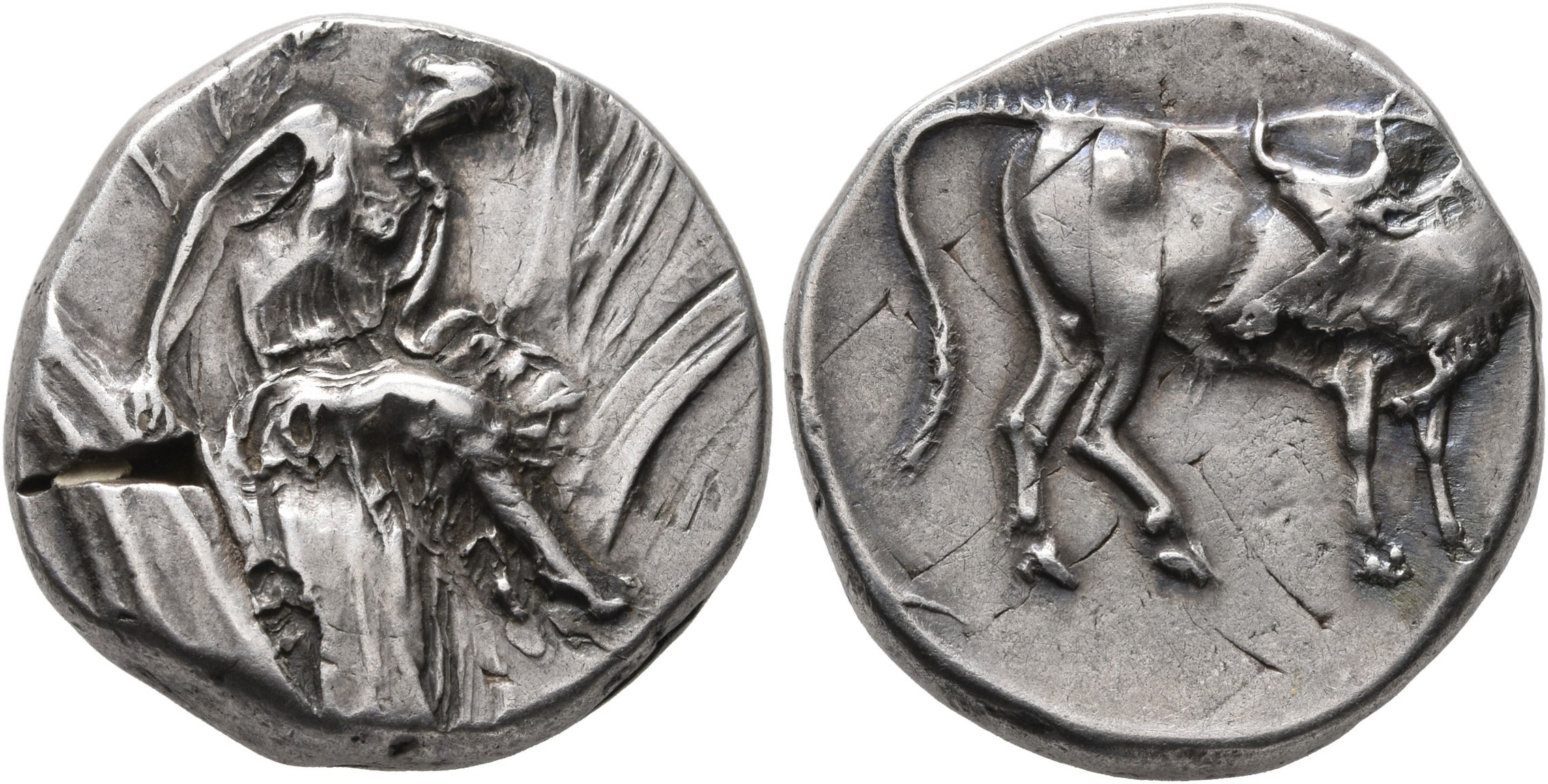1171 - Gortyn (stater Europa/bull) over Aegina (turtle/incuse square) (Leu, Oct. 2021, 71)
From SILVER
330 BCE - 270 BCE
Images
Overstriking coin

Gortyna on Aegina - Leu, 8, 23 Oct. 2021, lot 71.jpg [1]
Location/history
| Sale(s)Sale(s) ᵖ: | Leu, 8, 23 Oct. 2021, n°71 (privately acquired from Bank Leu on 18 August 1965 with a photocopy of the original invoice enclosed) = Kricheldorf, XIII, 23 Sept. 1963, 93 | ||
| Private collection(s)Private collection(s) ᵖ: | From the collection of Regierungsrat Dr. iur. Hans Krähenbühl | Archaeological contextArchaeological context: | from the 1953 Phaestus region Hoard (IGCH 152) |
Overstriking coin
Description
| ObverseInscription or printing placed on the obverse.: | Europa seated half-right in plane tree, leaning her right hand on branch and propping her head on her left | ReverseInscription or printing placed on the reverse.: | Bull standing right, turning its head back to left to lick its flanks |
Mint and issuing power
| MintIdentifies the place of manufacture or issue of a numismatic object.: | Gortyn | Ancient regionAncient region. | Crete | Modern countryModern country: Greece | AuthorityIdentifies the issuing power. The authority can be "pretended" when the name or the portrait of X is on the coin but he/she was not the issuing power. It can also be "uncertain" when there is no mention of X on the coin but he/she was the issuing power according to the historical sources: |
Chronology
| FromIdentifies the initial date in a range assigned in a numismatic context. 330 BCE toIdentifies the final date in a range assigned in a numismatic context.. 270 BCE | Hellenistic 323-30 BC |
Physical description
| MetalThe physical material (usually metal) from which an object is made.: Silver |
WeightWeight of the numismatic object (in grams). in grams: 11.5311.53 g <br />11,530 mg <br /> | DenominationTerm indicating the value of a numismatic object. Examples: tetradrachm, chalkous, denarius.: stater |
AxisDescribes the directional relationship between the obverse and reverse of a numismatic object.: 33 mm <br />0.3 cm <br /> |
| DiameterDescribes diameter of an object (in mm).: 2222 mm <br />2.2 cm <br /> | StandardStandard.: Aeginetic | ||
References
| Coin referenceReference of the Coin: | Le Rider 1966, 21c and pl. XIV, 4 (this coin) | Coin series referenceReference to coin series study: | Svoronos 18901Svoronos 1890, n° 59 and pl. XIV, 6, Le Rider 19662Le Rider 1966, 21c and pl. XIV, 4 (this coin), Carbone 20163Carbone 2016, n° 124-126 |
| Coin series web referenceCoin series web references: | |||
Overstruck type
Description
| ObverseInscription or printing placed on the obverse.: | Sea turtle. | ReverseInscription or printing placed on the reverse.: | Union Jack (visible on reverse) |
Mint and issuing power
| MintIdentifies the place of manufacture or issue of a numismatic object. ᵖ: | Aegina | Ancient regionAncient region. ᵖ | Attica | Modern countryModern country: Greece | AuthorityIdentifies the authority in whose name (explicitly or implicitly) a numismatic object was issued. ᵖ: |
Chronology
| FromIdentifies the initial date in a range assigned in a numismatic context. 456 BCE toIdentifies the final date in a range assigned in a numismatic context.. 351 BCE | Classical 480-323 BC |
Physical description
| DenominationTerm indicating the value of a numismatic object. Examples: tetradrachm, chalkous, denarius. ᵖ: | stater |
StandardStandard. ᵖ: | Aeginetic |
References
| Coin type referenceReference to coin series study ᵖ: | |||
| Coin series web reference overstruckCoin series web references overstruck: | |||
Additional data
| Frequency of overstrikesFrequency of overstrikes: | frequent | Level of confidenceLevel of confidence of the identification: | sure |
| RemarksRemarks: | |||
References
- ^ Svoronos, Ioannes N. (1890), Numismatique de Crète ancienne, accompagnée de l'histoire, la géographie et la mythologie de l'île. Première partie, description des monnaies, 2 vol., Macon, Impr. Protat frères.
- ^ Le Rider, Georges (1966), Monnaies crétoises du Ve au Ier siècle av. J.-C., Paris, Geuthner, 345 p. and 42 pl.
- ^ Carbone 2016
